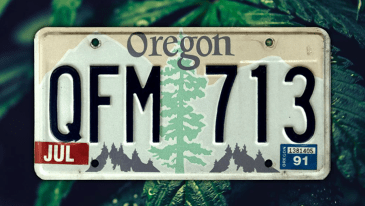
Democratic Gov. Kate Brown announced her intent to pardon some 47,000 Oregonians with low-level cannabis convictions.
According to a news release issued by her office earlier today: “The pardon applies to electronically available Oregon convictions for possession of 1 ounce or less of marijuana, in pre-2016 cases in which the person was 21 years of age or older, where this was the only charge, and where there were no victims. … The pardon will remove 47,144 convictions for possession of a small amount of marijuana from individual records, eliminating barriers for thousands of people seeking employment, housing, and educational opportunities who have otherwise been ineligible.”
State officials will also forgive more than $14,000,000 in associated fines and fees.
“No one deserves to be forever saddled with the impacts of a conviction for simple possession of marijuana — a crime that is no longer on the books in Oregon,” said Governor Brown. “Oregonians should never face housing insecurity, employment barriers, and educational obstacles as a result of doing something that is now completely legal, and has been for years. My pardon will remove these hardships.
The Governor’s action comes weeks after President Joe Biden announced his intent to pardon several thousand Americans with marijuana-related federal convictions. He also encouraged Governors to move forward with similar mass pardon relief.
Oregonians legalized marijuana for adults by deciding in favor of a voter initiative in 2014. However, the initiative’s language did not include provisions providing relief for those with prior cannabis convictions. In 2019, lawmakers passed separate legislation establishing procedures for persons previously found guilty of low-level (up to one ounce) marijuana possession offenses to file a motion with the court to have their convictions set aside. Yet, to date, relatively few Oregonians have utilized this process.
By contrast, several states, including California, Illinois, and New Jersey (among others), automatically review criminal cannabis convictions and expunge past records. As a result of these laws, an estimated 2 million Americans had their cannabis-related convictions set aside in recent years.
NORML’s Deputy Director Paul Armentano stressed the importance of providing pathways for those with cannabis convictions to have their records forgiven. “Tens of thousands of Americans unduly carry the burden and stigmatization of a past conviction for behavior that most Americans, and a growing number of states, no longer consider to be a crime,” he said. “Our sense of justice and our principles of fairness demand that public officials and the courts move swiftly to right the past wrongs of cannabis prohibition and criminalization.”
Governor Brown is not alone in her decision to issue pardons to those with marijuana-related criminal records. In recent months, the Governors of Colorado, Nevada, Illinois, and Washington have taken similar steps to grant tens of thousands of pardons to those with low-level marijuana convictions. In September, Pennsylvania’s Governor similarly announced efforts to provide pardons for people with select minor, non-violent marijuana criminal convictions.
Additional information on marijuana-related expungement laws is available from NORML.
Related
Medical Disclaimer:
The information provided in these blog posts is intended for general informational and educational purposes only. It is not a substitute for professional medical advice, diagnosis, or treatment. Always seek the advice of your physician or other qualified healthcare provider with any questions you may have regarding a medical condition. The use of any information provided in these blog posts is solely at your own risk. The authors and the website do not recommend or endorse any specific products, treatments, or procedures mentioned. Reliance on any information in these blog posts is solely at your own discretion.






